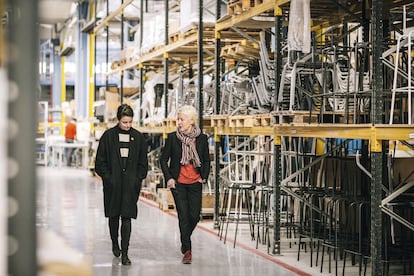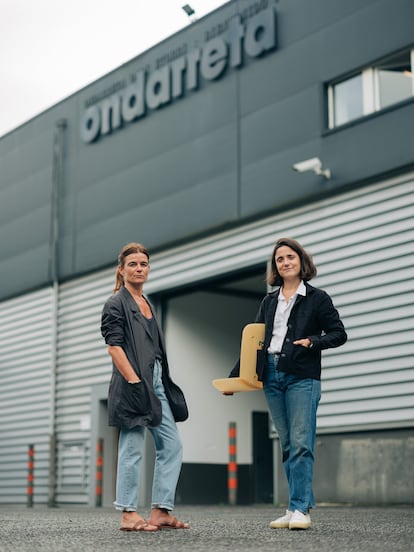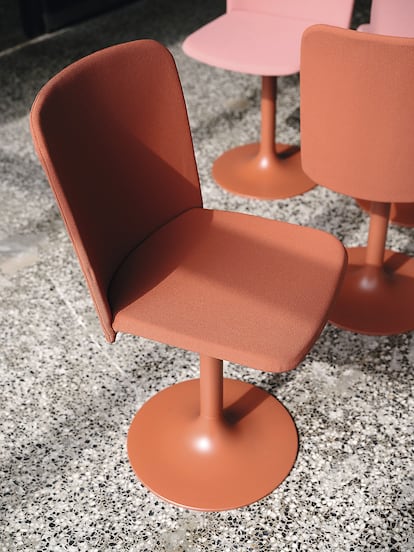The secret of Ondarreta, the Basque family firm led by women that works for Linkedin and Hermès
The San Sebastián-based brand, winner of the 2023 National Design Award, is committed to a functional, contemporary kind of furniture that is 100% rooted in its native land in northern Spain

To make a chair you only need a seat, a backrest and four legs — some designers even have enough with fewer than that. But to create one of the chairs designed by Ondarreta, the San Sebastián-based brand that has just won the 2023 National Design Award, it has taken three generations, a deep Basque spirit, and a vision of functional and contemporary design that is remarkable for its discretion. “Do not sit please,” says their motto. There is a lot behind these four words.
It all started in a small carpentry shop on Ondarreta beach, in the northern Spanish city of San Sebastián, in the heart of the Basque Country region. More than a workshop, Juan Arratibel’s place was a cabinetry: he worked by hand on classic furniture for high society at the beginning of the 20th century. That artisan work was maintained for several decades until the 1970s, when his son Juanjo Arratibel and his wife María Luisa Marilis Galardi took the reins of the business and began specializing in kitchens. “We are daughters and granddaughters of cabinetmakers. We make furniture in the contemporary world, which forces us to rethink tradition and innovation,” say Nadia and Nora, the Arratibel sisters at the helm of the family business. These two took over in the 2010s in a context of much greater supply, with more demanding and less loyal customers, and they soon launched an ultra-sophisticated, functional and very contemporary design line that has put their name on the map.
This represented a turning point in the company’s design and internationalization efforts. While Nora (the CEO) was traveling the world studying how to market their products in different new markets, Nadia (the architect and design director) began to design new chairs. One of the first was the one called Don. “With an industrial aesthetic, it was a model with which we got ahead of the market, and at first it did not sell,” Nadia recalls. Patience was her first great lesson: today it is one of the most successful items in Ondarreta’s collection.

Then came the Bob line, made up of tables, chairs and stools, with soft shapes and Nordic aesthetics. “It was our first own design and it signaled a before and after,” they remember. With a wide price range, the goal was to have a product for both the home and for industrial settings. At a time when the furniture industry was going crazy with contract —the design of furniture for offices, hospitality establishments or professional spaces—, Ondarreta found the formula to develop it. “We launched it at our first international fair, Maison&Objet in Paris. We believe that part of the success of this collection was (and is) that it fulfilled a concept of cozy contract, where the furniture is prepared to withstand high staff turnover, yet does not differ in aesthetics, quality and comfort from the furniture of domestic spaces.”
In addition to their own designs, they began to work with renowned designers such as Pascual Salvador and the architect Rafael Moneo. One of their best-known lines is Bai, created with Ander Lizaso in 2017; it is a light, no-frills design that summarizes the type of furniture that the Arratibel sisters believe in. Theirs is a kind of “silent design” where the product does not try to stand out above the rest, but rather must be read in its context. They talk about making “furniture with soul” that accompanies people and makes their environment a better space. “We make furniture to bring people together, create bonds and strengthen relationships. We want to foster moments of connection, give life to new spaces and enrich old places. We want meetings to have more charm and meetings to be more comfortable. We want to be helpful to those who write poems, design posters, send emails, enjoy dinner, contemplate art or play an instrument.”
The Arratibel sisters choose who they work with “based on their values and aesthetic criteria, which is why we have also done major projects with emerging designers such as Made Studio or Arquimaña.” But their collaborators also include great names of design such as Ben van Berkel, Sebastian Herkner and José Manuel Ferrero, and suppliers such as Harris Tweed, a collaboration that arose during Nadia’s trip to the islands of Lewis and Harris in Scotland: “I was immediately captivated by the landscape of sea, mountains and abundant nature. It is impressive to see how these materials continue to be dyed, spun and woven by hand by the islanders themselves. These iconic fabrics have often been used in the field of fashion, but not so much in furniture, and we found it to be a very interesting synergy.”
Their latest launch is called Supra, billed as “a versatile, ergonomic, stackable, competitive chair with a very differentiating aesthetic within its segment. Its material is totally new, it is a translucent polypropylene unique on the market. This design was made by Note (Design Studio), a Swedish studio with whom we had a nice connection from the beginning.”

Nordic spirit, Basque heart
Although its lines speak of Scandinavian designs, it is evident that Ondarreta could only be Basque. “The character of the north is an indispensable factor when pursuing our ideals in design: timelessness, functionality, harmony, sobriety, freshness… we value designs that can be industrialized yet unique,” say the sisters.
Asked what chair they would have dreamed of designing, they cite the Plastic by Eames (as modern today as it was 70 years ago), the Leggera by Gio Ponti (considered the wooden chair par excellence) and the Wishbone by Wegner (an icon of Danish design), three references that speak of versatility and discreet elegance, of getting more of the best for more people and for less, and with a sober beauty that defines Nordic design today. “An Ondarreta product can dress up an apartment, a hotel lobby or a co-working space,” they say.
Its 10 main suppliers are only 30 kilometers away and the components to make a chair travel only 150 kilometers. “We wanted to focus on quality and the use of local materials. To be consistent with local production, with people who identify with the project and with eco-design, coherent and respectful of both the environment and the families who are involved behind the entire project,” they say, alluding to their staff of 45, some of whom have been working in the company for more than 30 years.
And so, from San Sebastián to the world: Ondarreta has supplied furniture for the offices of Linkedin in Chicago, Hermès in Paris and the Centro Botín by Renzo Piano in Santander. They work only on demand, have a production time of four or five weeks, and sell in 40 countries. Nadia and Nora know that designing in 2023 involves studying their carbon footprint, minimizing assembly and packaging parts, improving the energy efficiency of their processes and working with sustainable materials. The main ones are European woods, steel (80% recycled and 100% recyclable), upholstery and polypropylene (with a sawdust finish or 100% recycled plastic).
Today Ondarreta no longer operates from the beach, but 12 km away in the direction of France, in an industrial warehouse located in the town of Oiartzun. A discreet home that has allowed them to bide their time and project their name into the future.
Sign up for our weekly newsletter to get more English-language news coverage from EL PAÍS USA Edition
Tu suscripción se está usando en otro dispositivo
¿Quieres añadir otro usuario a tu suscripción?
Si continúas leyendo en este dispositivo, no se podrá leer en el otro.
FlechaTu suscripción se está usando en otro dispositivo y solo puedes acceder a EL PAÍS desde un dispositivo a la vez.
Si quieres compartir tu cuenta, cambia tu suscripción a la modalidad Premium, así podrás añadir otro usuario. Cada uno accederá con su propia cuenta de email, lo que os permitirá personalizar vuestra experiencia en EL PAÍS.
¿Tienes una suscripción de empresa? Accede aquí para contratar más cuentas.
En el caso de no saber quién está usando tu cuenta, te recomendamos cambiar tu contraseña aquí.
Si decides continuar compartiendo tu cuenta, este mensaje se mostrará en tu dispositivo y en el de la otra persona que está usando tu cuenta de forma indefinida, afectando a tu experiencia de lectura. Puedes consultar aquí los términos y condiciones de la suscripción digital.








































